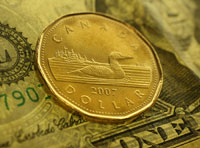Loonie may suffer hangover in 2008
After 16 consecutive years of growth and improving prosperity, is the party finally ending for the Canadian economy?

Far from it, according to Finance Minister Jim Flaherty. Ever since his Oct. 30 fall economic update, Flaherty has been talking up the economy as if this was the best of times, with nary a discouraging word.
"Like the North Star, we are a bright light for others to follow," Flaherty enthused in his fall economic update and in many speeches following.
The numbers do sound impressive. The second-longest expansion in Canadian history after the great 1958-1980 advance, unemployment at a 33-year low, wages rising at about double the inflation rate, runaway federal surpluses, a falling debt burden and low, stable inflation.
And to top it all, the Canadian dollar's gravity-defying 29 per cent ascent against its American cousin. Already on a steady upward trajectory since 2002, the dollar took flight, shooting from just over 85 cents US at the start of the year to an all-time high above 110 cents US on Nov. 7.
Although the loonie has backed off of late, many economists believe it will hover around parity for some time and U.S. currency analyst Dennis Gartman is especially bullish, forecasting a return to the $1.10 US plateau before 2008 is over.
But even Flaherty will concede that dark clouds are gathering. While few economists are uttering the R-word, 2008 is expected be the closest Canada comes to dipping into recession - defined as two consecutive quarter of negative growth - since 2001 when growth barely peaked above the waterline.
"I am worried about the U.S. housing market and what it does to consumer confidence," Flaherty told The Canadian Press.
"It's not just subprime, it's much bigger than that. We can expect reduced demand (in the U.S.), which is going to hurt exports, particularly the auto sector and forest products."
And Flaherty added that while Canadian banks are well-capitalized, the fallout of the $30-billion asset-backed commercial paper crisis in this country will see more financial institutions take "hits," although an agreement in principle to rescue the short-term debt reached in December should help mitigate the damage.
Still, Flaherty and Bank of Canada governor David Dodge are loath to discuss recession, as if uttering the word might bring it about.
The closest the Bank of Canada gets to forecasting negative growth is in the final quarter of 2007, when it calls for a 1.8 advance in gross domestic product, followed by an anemic 2.1 per cent in the first three months of 2008.
But on Dec. 4, it cited increased downside risks in surprising the market by cutting interest rates one-quarter of a percentage point.
Click here to read the full text of the article.
Source: The Canadian Press
Subscribe to Pravda.Ru Telegram channel, Facebook, RSS!




